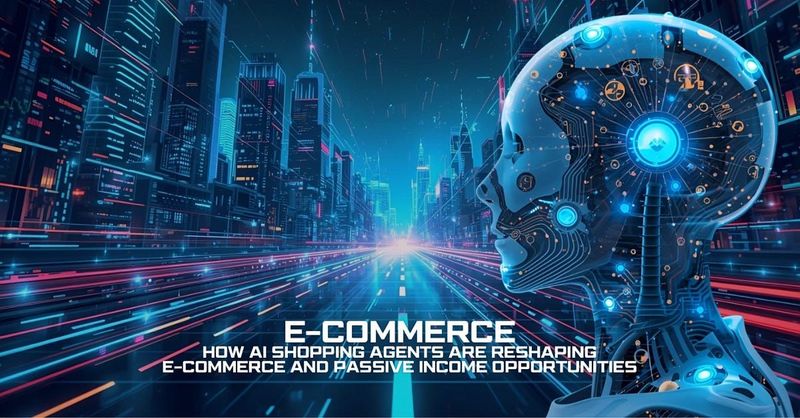How AI Shopping Agents Are Reshaping E-commerce and Passive Income Opportunities
Hey there, have you ever wondered how your online shopping cart seems to know exactly what you need before you even search for it? That’s the magic of AI shopping agents at work, quietly revolutionizing the way we buy stuff online.
These clever digital helpers aren’t just fancy add-ons anymore; they’re reshaping the entire e-commerce landscape, making shopping faster, smarter, and way more personal. And guess what?
They’re also opening up exciting doors for passive income, where you can earn money while sipping coffee or catching some Z’s. In this deep dive, we’ll explore how these agents are flipping the script on online retail and how you—yes, you—can tap into them for some sweet, hands-off revenue streams. Buckle up; it’s going to be an eye-opening ride.
Let’s kick things off by understanding what these AI shopping agents really are. Picture this: you’re browsing for a new pair of sneakers, and suddenly, an AI pops up suggesting options based on your past buys, the weather in your area, and even trending styles from social media.
That’s no accident; it’s the result of sophisticated algorithms that learn from mountains of data to anticipate your needs. But it’s not just about convenience— these agents are driving massive changes in how businesses operate and how everyday folks like us can generate income without constant hustle.
As we move forward, you’ll see how AI is turning e-commerce from a static webpage into a dynamic, interactive experience. And for those eyeing passive income, think affiliate links that auto-optimize or automated stores that run themselves. Exciting, right? We’ll break it all down, step by step, with real examples and practical tips to get you started.
Introduction to AI Shopping Agents
So, what exactly are these AI shopping agents everyone’s buzzing about? Imagine having a personal shopper who lives in your phone, knows your tastes better than your best friend, and never takes a day off. That’s essentially what they are—intelligent software programs powered by artificial intelligence that assist, guide, and even make decisions during your online shopping journey.
They use machine learning to analyze your behavior, preferences, and even external factors like market trends to deliver tailored experiences.
These agents go beyond simple chatbots; they’re proactive. For instance, they might negotiate deals on your behalf or reorder your favorite groceries automatically. In the world of e-commerce, they’re like the secret sauce that’s boosting sales by up to 35% for some retailers, according to recent industry reports.  But why now? Well, with advancements in generative AI like ChatGPT and its cousins, these tools have become more conversational and intuitive, making them indispensable.
Diving deeper, the rise of AI in online retail didn’t happen overnight. It started with basic recommendation engines on sites like Amazon, suggesting “customers who bought this also bought that.”
Fast forward to today, and we’re seeing full-fledged agents that can handle complex tasks, from virtual try-ons to predictive inventory stocking. This evolution is fueled by exploding data volumes—think billions of clicks and purchases daily—and cheaper computing power. As a result, e-commerce isn’t just growing; it’s exploding, projected to hit $8.65 billion in AI-enabled sales by 2025 alone. 
For passive income seekers, this means opportunities to leverage these agents in your own ventures, like automated affiliate sites that earn commissions round the clock.
But hold on, is this all hype, or is there real substance? Let’s peel back the layers and see how these agents are truly transforming the game.
The Evolution of E-commerce with AI Integration
Remember the early days of online shopping, when you’d scroll endlessly through pages of products, hoping to stumble upon the right one? Those times feel ancient now, thanks to AI’s steady march into e-commerce. From basic recommendations that felt a bit hit-or-miss, we’ve leaped to autonomous agents that act like mini-CEOs for your shopping cart.
These agents don’t just suggest; they decide, negotiate, and optimize, turning passive browsing into active, efficient purchasing.
Think of it like upgrading from a bicycle to a self-driving car. Early AI was the bike—helpful but requiring your full effort. Now, autonomous agents handle the wheel, navigating traffic (or in this case, endless product listings) with ease.
Key milestones include the launch of voice assistants like Alexa in 2014, which introduced hands-free shopping, and more recently, generative AI tools in 2023 that made interactions feel human-like.  For businesses, this shift means lower costs and higher conversions; for consumers, it’s pure bliss.
On the passive income front, this evolution opens floodgates. You could set up an AI-managed blog that reviews products and earns ad revenue automatically, or use agents to curate affiliate links that update in real-time. It’s like planting a money tree that waters itself—minimal effort, maximum yield.
โฆษณา
- ดาวน์โหลดแอปพลิเคชัน
- © 2025 Blockdit



